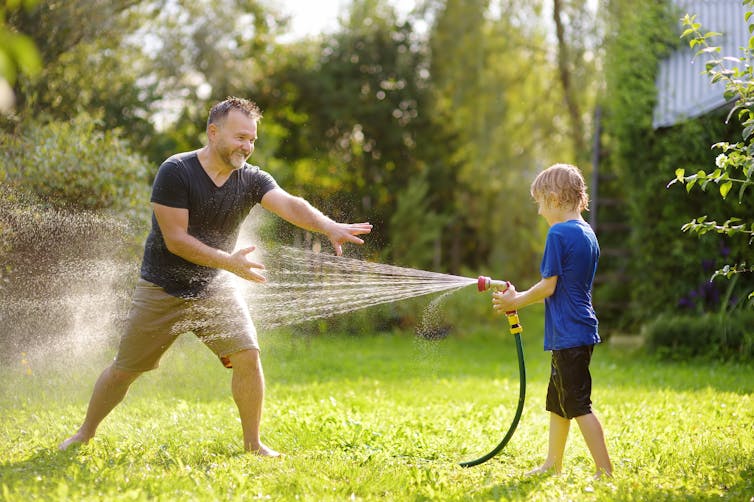
Dry conditions and impending drought mean millions of people in the UK are now, or will soon be, under a hosepipe ban. There is a “temporary use ban” in Hampshire and the Isle of Wight, with Kent and Sussex to follow. It’s virtually impossible for water suppliers to enforce this ban themselves, so some are reportedly urging customers to report if they spot neighbours flouting the bans.
This presents an ethical dilemma: If you see your neighbour filling up the paddling pool for the third time this week, should you snitch? In philosophical terms: is it morally obligatory to report on your neighbour’s hosepipe use? The alternatives are that it is morally permissible (you can do, but you don’t have to) or that it is morally impermissible (you could be doing something morally wrong if you snitched on your neighbour).
This might not seem like the most pressing problem an ethicist could grapple with but sometimes dealing with a relatively trivial issue is a good way of coolly and rationally working out the solution to more significant problems. For instance, maybe tackling this question can inform decisions about whether to snitch on your neighbours in a life-or-death scenario (the kind of dilemma that faced German citizens during the 1930s, or many of us during strict lockdown measures).
Moral philosophy offers us three ways of approaching the hosepipe question. I can’t promise a straightforward answer (philosophy is about provoking deep thought, rather than a dogma to follow), but the following approaches should help steer your thinking.
Utilitarianism: snitching for the greater good
Utilitarianism, which has its roots in the work of Jeremy Bentham, John Stuart Mill and Harriet Taylor Mill, and Susanna Newcome, is the view that a good action is one that generates the greatest amount of pleasure (or “utility”) for the greatest number of people.
Imagine that local governments are encouraging residents to report each other’s hosepipe usage. Their assumption would be that any displeasure caused by going behind your neighbours’ back would be offset by the widespread benefit of reducing water usage. That seems plausible, but what counts as the consequences of one action is not totally obvious.
Consider the long-term consequences of snitching on your neighbours’ hosepipe usage. Sure, it might help stave off drought this summer, but it might also foster an atmosphere in which neighbours are expected to snitch on each other about anything.
Casually mention across the fence that you haven’t renewed your TV license, and you might end up being reported. In turn, this might completely erode trust between households. As the case of Stalinist Russia showed, the consequences of civil distrust can be disastrous.
Deontology: do the ‘right thing’, no exceptions
Deontology, otherwise known as Kantian ethics (after German philosopher Immanuel Kant), is all about moral absolutes. While utilitarianism tells us to take moral dilemmas on a case-by-case basis, deontology is about finding universal moral laws that should never be broken.
Kant tells us that we can do this by imagining a world in which everyone followed a particular moral code, and asking ourselves two questions: Could we live in such a world? And would we want to?
For this example, let’s take the moral code: “Always inform the authorities when you observe hosepipe overuse.” It seems like we could live in a world where this was the law of the land. But would we want to?

Maria Sbytova / Shutterstock
Again, it’s the requirement that we snitch on one another that’s going to cause problems. In some circumstances, using more than my daily quota of water could be morally permissible. Perhaps I am growing vegetables to send to a local food bank. Sometimes, making exceptions to the rules looks like the right thing to do -– but deontology does not permit such exceptions.
Virtue ethics: living the ‘right’ kind of life
Virtue ethics, which dates back to ancient Greece and Aristotle, isn’t about right or wrong actions or moral laws. Instead, virtue ethics tells us that the most important thing is to be the right kind of person and live the right kind of life. And this involves behaving virtuously –- and avoiding vices.
Is doing what your local government tells you to do virtuous? Maybe, though not obviously (are all governments moral?). Is it virtuous to help stave off a drought? Sure. But is it virtuous to snitch on your neighbours? Most people’s answer to that question would probably be no.
Examples of virtues include honesty, loyalty and kindness. Snitching on people does not seem to exhibit any such character traits. In fact, it looks more like dishonest behaviour. “The ends justify the means”, someone might reply. But for a virtue ethicist, vicious behaviour can never lead to the ultimate end: human flourishing.
South East Water is right to try and avert a drought, and a hosepipe ban might be the way to do it. But three of philosophy’s best-known moral theories suggest that snitching on our neighbours is probably not the right thing to do.
A better option would be doing more to inform people of the importance of using water carefully, and advice on how best to do so. This approach might encourage people to consider how their individual actions have wider consequences, without creating an atmosphere of mistrust.
![]()
Peter West does not work for, consult, own shares in or receive funding from any company or organisation that would benefit from this article, and has disclosed no relevant affiliations beyond their academic appointment.

